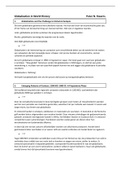Assignment 3
Semester 2 2024
DUE 11 September 2024
, Nation-State and Nationalism: A Symbiotic Development in the 19th Century
The 19th century was a transformative period marked by the consolidation of the
modern nation-state and the rise of nationalism as a potent political force. This
relationship can be best understood as symbiotic, where the emergence of the
nation-state fueled nationalist sentiments, and conversely, nationalism played a
critical role in shaping and legitimizing the modern nation-state.
1. The Modern Nation-State and Nationalism
A nation-state is characterized by a defined territory, a centralized government, and
a population with a shared sense of identity or belonging, often linked to common
language, culture, or history. Nationalism, on the other hand, is the ideology that
emphasizes loyalty, devotion, or allegiance to a nation or nation -state and its
interests above those of other groups or regions. The concept of nationalism is
rooted in the belief that each nation has the right to self-determination and
sovereignty.
2. Historical Context of the 19th Century
The 19th century saw the decline of empires and multi-ethnic kingdoms, and the rise
of movements that sought to align political boundaries with ethnic and cultural ones.
This period was marked by significant events, such as the French Revolution and the
Napoleonic Wars, which spread the ideas of national sovereignty and self -
governance across Europe. The Congress of Vienna (1814-1815) attempted to
restore old dynasties and suppress nationalist movements, but the spirit of
nationalism had already taken root, leading to the unification of Germany and Italy
later in the century (Tilly, 1994).
3. Nation-State Building and Nationalism: A Two-Way Street
The relationship between the modern nation-state and nationalism is complex
and interdependent:
Nationalism as a Tool for State-Building: Nationalism provided a unifying ideology
that could mobilize populations in support of state-building efforts. For instance, in
Germany, nationalism was used as a rallying cry to unite disparate German -
speaking states into a single German Empire in 1871 under Otto von Bismarck's
leadership. Similarly, in Italy, nationalist leaders like Giuseppe Garibaldi and Cou nt
Camillo di Cavour worked to unify various Italian states into a single nation -state.


